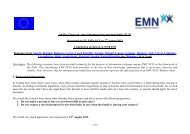POLICY REPORT ON IMMIGRATION AND ASYLUM IN LATVIA ...
POLICY REPORT ON IMMIGRATION AND ASYLUM IN LATVIA ...
POLICY REPORT ON IMMIGRATION AND ASYLUM IN LATVIA ...
Create successful ePaper yourself
Turn your PDF publications into a flip-book with our unique Google optimized e-Paper software.
89<br />
ANNEX OF THE EUROPEAN PACT <strong>ON</strong> IMMIGRATI<strong>ON</strong> <strong>AND</strong> <strong>ASYLUM</strong><br />
<strong>AND</strong> THE STOCKHOLM PROGRAMME<br />
LEGAL IMMIGRATI<strong>ON</strong> <strong>AND</strong> <strong>IN</strong>TEGRATI<strong>ON</strong><br />
1. Economic migration<br />
1.1 European Pact on Immigration and Asylum (1-2 paragraphs in the text box created for<br />
each commitment)<br />
The relevant commitments in the Pact for this sub-section are in particular:<br />
I(a) Implement policies for labour migration<br />
Please describe the (planned) introduction of a new labour migration policy or changes to<br />
the existing one. Elaborate any new aspects (e.g. introduction of quota, lists of professions,<br />
agreement with specific third countries, use of private recruitment services, etc). Specify<br />
whether these address any specific groups of migrants and describe any groups which are<br />
not addressed under the subsequent commitments in this sub-section. Also consider the<br />
effect of the economic crisis on labour migration (e.g. revision of quota, reduction of<br />
professions listed, etc).<br />
The regulatory enactments in Latvia that regulate the employment of third-country<br />
nationals are created horizontally and applied to all third-country nationals equally.<br />
In 2010, there are changes in the field of legal immigration of Latvia: Law of 22 April<br />
2010 “Amendment to the Immigration Law" entered into force on 1 July 2010, which provides<br />
several important amendments, particularly in relation to reception of third-country nationals<br />
for employment. The Amendment to the Immigration Law provides the establishing of a one<br />
stop agency by inviting guest workers from third countries. It means that employers will no<br />
longer need to visit the State Employment Agency where education documents and<br />
employment contracts of such guest workers were assessed, a work invitation letter was<br />
approved and after that – the Office of Citizenship and Migration Affairs for approval of the<br />
invitation letter to request a residence permit, but only the Office of Citizenship and Migration<br />
Affairs which shall examine documents of employment and residence thus saving time and<br />
simplifying the administrative procedure.<br />
I(b) increase the attractiveness of the EU for highly qualified workers and further facilitate the<br />
reception of students and researchers:<br />
Please describe any (planned) measures to facilitate access of highly qualified workers,<br />
students and researchers. Refer to the implementation of the Blue Card Directive.<br />
Describe any incentive mechanisms for highly qualified workers, students and<br />
researchers on top of the transposition and implementation of EU legislation. Also<br />
consider the effect of the economic crisis.<br />
On 27 May 2010, the Meeting of the State Secretaries announced draft law<br />
"Amendment to the Immigration Law", which was developed in order to introduce Council<br />
Directive 2009/50/EC of 25 May 2009 on the conditions of entry and residence of third-country<br />
nationals for the purposes of highly qualified employment (henceforth – the Blue Card<br />
Directive).<br />
The above-mentioned amendment includes the requirements of the Blue Card Directive.<br />
The draft law includes the definition of the Blue Card of the European Union, periods have




